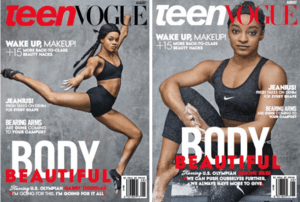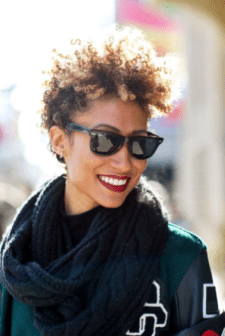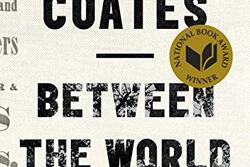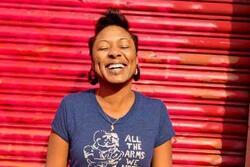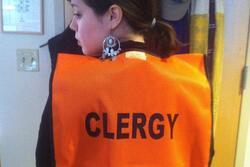Black Lives Matter, and Get Thoughtful Coverage, At Teen Vogue
After last week’s murders of Alton Sterling and Philando Castile by police officers, America’s cities erupted in protest. A tragic and incendiary week became even more violent when a gunman opened fire on a Dallas protest, murdering five police officers. The resulting media frenzy was, overall, disheartening. Some of the worst journalism of the week included CNN’s decision to invite Congressman Joe Walsh to defend a tweet in which he declared war on Obama and Black Lives Matter, the Washington Post’s misleading conflation of BLM protestors with Black Panthers, and The Blaze’s Tomi Lahren calling BLM the “new KKK.” Less overtly offensive articles and talk show segments were speculatory, lukewarm, or sensational.
Luckily, there is another publication to turn to: Teen Vogue.
To the surprise of many, Teen Vogue has become a leader in journalism over this difficult week, offering more comprehensive and well-written coverage than most news outlets. Teen Vogue ran stories covering President Obama’s remarks in the wake of the violence; interviews with Philando Castile’s girlfriend, Diamond Reynolds; news about the Bahamas travel ban; and advice and resources for aspiring allies. When news outlets turned a blind eye as prominent Black Lives Matter activist Deray Mckesson was tackled and arrested in Baton Rouge for “obstructing a roadway” during a peaceful protest, Teen Vogue covered the story from beginning to end, posting updates about his unlawful arrest and tweeting the number of the Baton Rouge police department so that readers could call to demand the release of Mckesson and the other protestors.
Once a kind of elitist, rich girl’s Seventeen, Teen Vogue’s pages in the past were plastered with leggy, lily-white models in Chanel, advertised astronomically priced face creams from Japan, and every now and then included an article about the dangers of stress or party drugs. Today, the magazine is almost unrecognizable. In recent years, Teen Vogue has covered issues from sexual assault to gun violence to this election cycle. Even the beauty spreads have undergone a dramatic change: this year’s April edition featured young women of color celebrating their respective cultures with Afros, feathers, and traditional Southeast Indian jewelry.
The new, improved, Teen Vogue is largely the work of Elaine Welteroth, who at 29 became the magazine’s youngest and first African-American Editor-in-Chief. After climbing the ladders at Ebony and Glamour and becoming the first black Beauty and Health Director at Teen Vogue, Welteroth’s most recent accomplishment elicited cheers throughout the magazine world. During her career, Welteroth has done her part to amplify previously unheard voices; interviewing Muslim beauty bloggers, transgender models, and up-and-coming African-American artists. In her new position, Welteroth is continuing to shine a light on women of color and especially on young black women. July’s cover features gymnasts Gabby Douglas and Simone Biles in their workout gear–it’s a glorious display of #BlackGirlMagic. Brown and black girls previously alienated by the overwhelming whiteness of teen magazines can now look to Teen Vogue to find tips for maintaining natural hair and combatting microaggressions on campus. Opening a magazine to find pages celebrating inspiring, hard-working, innovative women of color is tremendously powerful.
Here are a few things we can learn from Welteroth and Teen Vogue’s success:
1. Today’s teen girls are ready to shake things up. They care deeply about the issues affecting their country and their world and are ready to tackle them head on. Despite the increased presence of smart and successful teens like Tavi Gevinson and Amandla Stenberg, there exists a pervasive stereotype of the teenage girl as vapid, boy-crazy, and self-absorbed. People assume that sixteen-year-old girls would rather read about lip gloss than something as serious as racist policing, when in fact these two interests are hardly mutually exclusive. Knowledge is power, and fashion magazines can be a mobilizing force.
2. Black women in leadership positions are essential. When it comes to big publications like Teen Vogue, change happens from the top down. Elaine Welteroth’s incredible work is a testament to that. The worlds of writing, fashion, and business have been dominated by the white and male for too long. If it limits decision-making to white people, a magazine limits the number of perspectives and therefore the number of people it is able to represent. Even if you were to throw out the ethical reasoning behind why diversity matters, the fiscal logic is clear: people want, and are going to buy, media that reflects them: their passions, interests, and struggles.
3. Teen Vogue covering issues like police brutality increases accountability. After Deray Mckesson’s arrest in Baton Rouge, Teen Vogue writers reached out to the Baton Rouge police department for comment. Imagine that––you’re getting calls from CNN, Fox, the New York Times … and Teen Vogue? That one phone call shows that a whole new demographic knows and cares about what is happening in their country.
Often, the response to seeing injustice and pain on such a large scale is a feeling of helplessness. What can we do when it seems like every other day another black person’s life is stolen, when mass shootings have become the norm? Of course, direct action is important. Getting out on the street to protest police brutality, calling your representative to voice your outrage and hurt, and donating to the victims’ families are crucial steps in healing our nation’s history of racism and violence. But there are also subtler ways that one can contribute to a more equitable world––for example, supporting black art and writing. Being a critical news reader. Looking out for the future Elaine Welteroths in your workplace and making sure they get their shot at fulfilling their potential. Consciously consuming nuanced, respectful, and diverse media. And now, subscribing to Teen Vogue.


